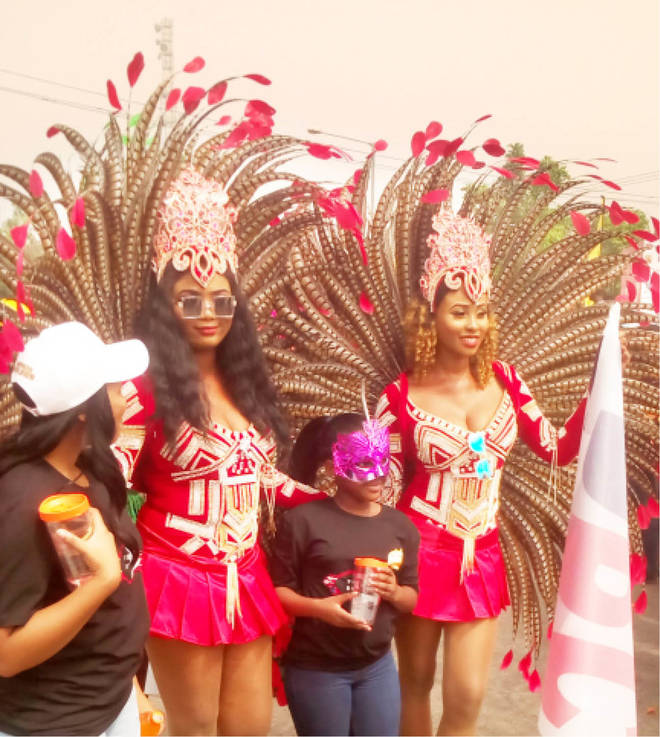
The annual 30-day Calabar Carnival is seen as the biggest party in Africa. As a result of this, many more states in Nigeria are now replicating what former Governor Donald Duke started in Cross River State 14 years ago. The carnival has made the state capital more popular as more people, including foreigners, throng the ancient Calabar city for the celebration on a yearly basis.
As a result of the carnival, last week, some local airlines announced the resumption of flights from Abuja to Calabar and Lagos to Calabar. Such operations were suspended a long time ago.
But local and foreign participants and onlookers are beginning to wonder if the carnival is actually meant to showcase the people’s culture or celebrate nudity.
The last carnival hosted by former Governor Liyel Imoke in December 2014 and subsequent ones by his successor, Ben Ayade, witnessed the presence of Brazilian women and other groups of women and even young men whose dressings promoted what many described as nudity. The foreign women usually exposed sensitive parts of their bodies, thereby attracting undue attention of local and international media outlets.
This is one aspect of the Calabar Carnival that many concerned citizens, religious and civil society groups have seriously frowned at, saying it carries immoral influence, especially on the youth and children.
“It makes our efforts to curtail promiscuous and amorous behaviours amongst our young populace very challenging because the government comes all out to encourage it,’’ a 60-year-old crusader against immorality in schools, Mrs Catherine Ene Cobham said.
She said that although the carnival was a welcome event, mostly because of the crowd it attracts, thereby boosting the economy of the state, it has completely destroyed the people’s culture, which it was meant to project.
Also condemning the display of nudity during the carnival, Pastor Abraham Ekpenyong of Redeemers Assembly Calabar, said, “Look at the performances by artistes; what did you see or hear from them? They sang and acted sex. Won’t the people, especially children, copy all these? At the different night parties where some of them performed you heard of crimes and rape.’’
However, the organisers argue that such costumes are added to beef up the content of the one month event. It usually climaxes on Boxing Day for children, and the next day for the main star attractions – the street parade. These usually include a long trek from the famous Millennium Park, otherwise called Eleven-Eleven roundabout, through major roads like Mary Slessor, to Marian, meandering through MCC, negotiating the Murtala Mohammed highway and stopping at the UJ Esuene Stadium.
The five registered musical groups – Passion, Masta Blasttas, Freedom, Seagul and Bayside, all led by prominent sons and daughters of the state, usually lead the dancing competition as they display to the admiration of spectators.
Cultural groups from various states, countries and individuals who were registered for the event, also display, accompanied by their rhythms, styles and colours. Usually, their attires depict the identity of their organisations and the theme of the year. Last year, the theme was about environment, but this year, it’s migration.
The introduction of boat regatta to the Christmas carnival is outstanding, especially among the Efik, the owners of the land. It was spiced with water traditions of the people, in honour of the Obong of Calabar and their deities.
Commending the innovation, the Obong of Calabar, His Eminence, Edidem Ekpo Okon Abasi-Otu V, said the boat regatta had boosted the carnival and illustrated the recognition of ancestors. The monarch said it had added value to the annual Utomo Obong festival, which is celebrated to honour the traditional ruler every end of the year. He said the boat regatta would attract more people to the carnival as it projects the Efik culture and tradition.
At the boat regatta, the 12 Efik clans in the state slugged it out, after which the Enwang clan emerged winner and got a N500,000 prize. Itu and Eki clans were runners-up and went home with N350,000 and 250,000 respectively.
Speaking on the content of the event, the Cross River State commissioner for tourism, Eric Anderson, said theatre programmes had also been incorporated into the carnival. He said four theatre programmes would take place at the Cultural Centre, while there would be temporary structures to host a barbecue party at Calasvegas, a new city about to be constructed on the Twin Island in Calabar.
As the special adviser to the governor on events management, Ken Aklah, had hinted, Flavour, a Nigerian music sensation and South African star, Mafikizolo, were among the artistes that entertained the over 3,000 guests at the occasion.
Other events included what many described as wonders on wheel, which essentially involves a display of exotic cars by participants.
Out of the 500 exotic motorbikes expected at the event, according to Aklah, 250 displayed. Among those at the vanguard of acrobatic display on their customised state-of-the-art exotic bikes were Governor Ben Ayade and former Governor Donald Duke. Last year, the duo also paraded exotic motorbikes, Like last year, both of them had their wives behind them on display.
This segment, which kicked off about 2pm, witnessed a large turnout of spectators who laid siege on the 12-kilometer carnival route to witness the acrobatic and colourful display.
Ayade and his group of riders took to the road from the Millennium Park, to the admiration of watchers.
This was followed by the second edition of the Miss Africa beauty pageant. After the contest, a 21-year-old Gaseangwe Balopi from Botswana was adjudged the winner. She went home with a whopping US$35,000 and a brand new Ford Escape SUV. She defeated 24 other contestants.
Bolapi was crowned by the wife of the Cross River State governor, Dr. Linda Ayade.
The new queen will serve as an ambassador for climate change and migration, which was the theme for this year’s event.
The first runner-up was a 23-year-old Fiona Muthoni Naringwa from Rwanda who went home with US$10,000, while the second runner-up, Miss South Africa, Luyolo Mngonyama, 26, won US$5,000.
They thanked Governor Ayade for giving them the opportunity to showcase their beauties, as well as the prizes attached to it.
Balopi, the overall winner said, “I am grateful to God for this privilege to serve humanity. I am also thankful to Governor Ayade and his wife, Linda, for providing the platform for young people like me to join in the fight to end climate change and migration.”
Congratulating the winners and other participants, Ayade urged them to continue with their good and exemplary behaviours.
The 24 contestants came from Angola; Algeria; Botswana; Burkina Faso; Burundi; Cameroon; Congo; Ethiopia; Gabon; Ghana; Ivory Coast; Kenya; Mozambique; Namibia; Rwanda; Sierra Leone; Somalia; South Africa; South Sudan and Swaziland, as well as Tanzania, Zambia and Zimbabwe.
The judges included Nigeria’s musician, Iyanya; Jamaica’s international fashion expert, Erica Freemantle; former Nigerian beauty queen, Munachi Abi and Ndaba Mandela of the Africa Rising Foundation and grandson of the late Nelson Mandela, as well as a New York-based motivational speaker, Millen Magese.
Much of the events held at the magnificent Calabar International Conference Centre and few at the Cultural Centre.
It was gathered that each year, the Cross River State Government releases huge sums of money for the carnival. For instance, this year, each of the five musical bands reportedly received N100million to enable them prepare and buy costumes, as well as pay its members. This amount is different from the prize money set aside for eventual winners.
In addition to this, the state government takes care of the air tickets, accommodation and feeding of all the invited groups and individual artistes, apart from the five bands. They are also paid huge amounts of money as honorarium.
Last year, Governor Ayade was said to have spent N450million to erect platforms, 50 massive loud speakers, as well as paint and decorate the major routes where the bands, troupes and surging crowds would dance. They were later dismantled. This year, new platforms and loud speakers were erected. And no one dares to ask what happened to the former ones.
Critics fear that the government may have used part of the Paris Club refunds to sponsor Calabar Carnival, which they argue, does not benefit the common man in any way.
But the chairman of the Cross River State Carnival Commission, Gabe Onah, told journalists that they received several overtures from private firms to fund the event. He, however, did not disclose how much they generated last year, neither did he have any projection for this year.
Onah disclosed that last year, 14 countries participated in the carnival but 22 were expected this year. He was hopeful that by 2020, the carnival would generate the income to fund it. He said the event had attracted big sponsors, such as DSTV, MTN, UBA, Guinness, Coca-Cola, and many more.
Speaking during the three Dry Runs that served as prelude to the main attraction, Minister of Information and Culture Lai Mohammed, said the carnival had not only boosted the economy of the state but also that of the country. He was happy that the event had been sustained by successive governors.
Also speaking, Hon Essien Ekpenyong Ayi, member representing Calabar South, Akpabuyo and Bakassi in the House of Representatives, lauded the efforts of the state government at sustaining the carnival. He said the carnival was uniting Nigerians and creating wealth. He expressed happiness that more tourists and fun lovers were attracted to Calabar for the annual event.
On his part, Mr Charles Ogar, the president of Hotel Owners Association in Calabar expressed happiness at the carnival, saying his members usually records increased patronage during the event. He, however, said that only the hotels situated along carnival routes record a good number of guests.
A taxi driver, Ndarake Johnson, said that although fuel scarcity affected his business, he was able to make good money during the event.
A dealer in carnival kits, Orji Obinna, said he did not regret this year’s celebration because he was able to make good sales.
However, at the Carnival Village in Calabar Municipality, where assorted businesses like fast food and drinking joints, fried fish and roasted meat corners, Christmas shops, children and family sections are located, patronage was not as expected.
Observers said this may not be unconnected with security issues around the venue, a situation that really scared people away from the event last year. Pickpockets and armed robbers were said to have attacked guests and fun seekers.
Reacting to the security situation last year, the special adviser to the governor on events management had told journalists that such ugly incidents would not occur again.




